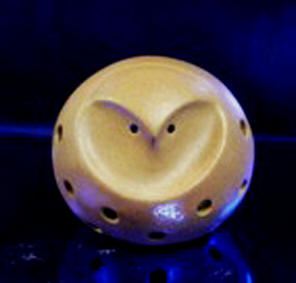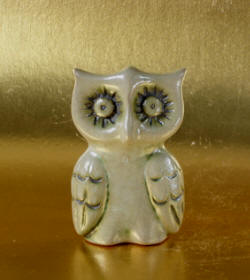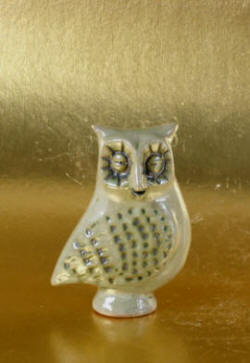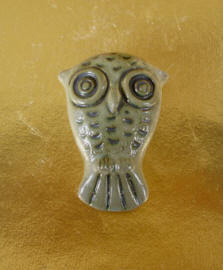|
|
Ceramic owls
collection
owl: the
mythological bird
 |
 |
 |
Owl#1
Code:07O1(
Height:14.5cm)
|
Owl#2
Code: 07O2
(Height:13.5cm)
|
Owl#3
Code: 07O3 (Height:7.5cm)
|
 |
 |
 |
Owl#4
Code: 07O4 (
Height:12cm)
|
Owl#5
Code: 07O5 (
Height:10.5cm)
|
Owl#6
Code: 07O6 (
Height:11cm)
|
 |
 |
 |
Owl#7
Code:
07O7 (
Height:11cm)
|
Owl#8
Code:
07O8 (
Height:9
cm)
|
Owl#9
Code: 07O9
(Height:12cm)
|
 |
 |
 |
Owl#10
Code: 07O10 (
Height:7cm)
|
Owl#11
Code: 07011 (
Height:6 cm)
|
Owl#12
Code: 07O12 (
Height:8.5
cm)
|
Owls
mythology
In the mythology of ancient
Greece,
Athene, the Goddess of Wisdom, was so
impressed by the great eyes and solemn
appearance of the Owl that, having banished
the mischievous crow, she honoured the night
bird by making him her favourite among
feathered creatures. Athene's bird was a
Little Owl, (Athene noctua). This
Owl was protected and inhabited the
Acropolis in great numbers. It was believed
that a magical "inner light" gave Owls night.
As the symbol of Athene, the Owl was a
protector, accompanying Greek armies to war,
and providing ornamental inspiration for
their daily lives. If an Owl flew over Greek
Soldiers before a battle, they took it as a
sign of victory. The Little Owl also kept a
watchful eye on Athenian trade and commerce
from the reverse side of their coins.
|

Athenian silver tetradrachm
Classical style, 5th
century BC.
|

Athenian silver tetradrachm
Hellenistic style, 2nd century
BC.
|
In early Rome a dead Owl nailed to the door of a house
averted all evil that it supposedly had
earlier caused. To hear the hoot of an Owl
presaged imminent death. The deaths of
Julius Caesar, Augustus, Commodus Aurelius,
and Agrippa were apparently all predicted by
an Owl.
"...yesterday, the bird of night did sit
Even at noonday, upon the market place,
Hooting and shrieking" (from
Shakespeare's "Julius Caesar")
|